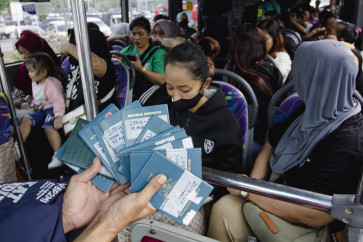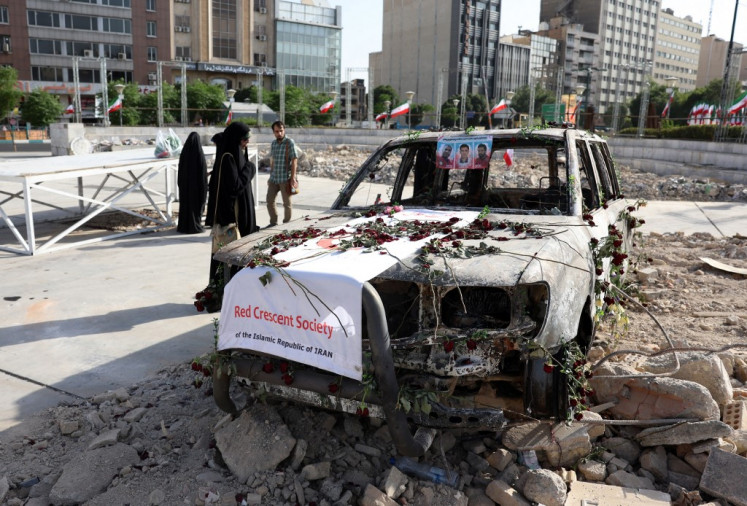Popular Reads
Top Results
Can't find what you're looking for?
View all search resultsPopular Reads
Top Results
Can't find what you're looking for?
View all search resultsThe much needed new growth strategy
Indonesia needs to change its growth strategy as the present engines of growth have ended because of global recession and slow growth in China and India
Change text size
Gift Premium Articles
to Anyone

I
ndonesia needs to change its growth strategy as the present engines of growth have ended because of global recession and slow growth in China and India.
Over the past two decades, the major foreign exchange earners and prime movers of economic growth in Indonesia have been the boom in the prices of raw materials as well as exports of uneducated and unskilled workers all over the world. The main exports of raw materials from Indonesia are coal and palm oil as well as seafood, particularly to China and India. Because of the positive external shocks, the economy grew by 5 to 6 percent per annum since 2000.
As the capital intensive mining sector does not absorb many workers, the boom does not contribute much to improvement in income distribution ' the Gini coefficient only slightly increased from 0.35 in 2008 to 0.38 in 2010.
The boom in the prices of raw materials was primarily because of the rapid economic growth, industrialization, motorization and mechanization in China and India that demand all kinds of raw materials. The more affluent population needs a better quality of foods including cooking oil made from palm oil and seafood from Indonesia.
To maintain its growth momentum and create jobs for its uneducated and unskilled labor force, Indonesia should shift its growth strategy from inward-looking to export-led and outward-looking growth strategy. The new strategy will invite MNCs (multinational corporations) and join international production networks and supply chains and take benefits of division of labor through vertical specialization in the global market. Because of the inward-looking strategy, Indonesia is left out of the global division of labor that has been going on since the 1980s, particularly with regards to production of parts and components of manufactures.
But Foreign Direct Investment (FDI) in Indonesia mostly serves the local market and does not benefit in the vertical specialization. Of the 25 countries assessed by OECD in 2012, Indonesia is deemed as one of the most restrictive against FDI. Because there is no job opportunity at home, our workers migrate all over the world doing all kinds of low paying menial jobs.
In contrast, FDI in China and other ASEAN countries linked to processing trade to serve both domestic and international markets. Manufactures are now accounted for more than 70 percent of exports of most of East Asian countries, including Malaysia, and over half of these comprises of machinery and transport equipment.
The East Asian production networks generate employment as they are mainly in the manufacturing sector that does not need highly skilled workers and advanced technology. The high tech products, such as the iPhone and iPad that is designed by Apple in California but the products are fully manufactured in China using spare parts and component made by various companies in many countries.
International Production Network (IPN) is a sequence of production stages in different countries and each state is a sum of several parts production and their assembly activity. Once a group of parts are assembled, it subsequently becomes either a component for the next stage or a final good.
There are two models of IPN, namely the spider type and the snake type. In the spider type, production activities with multiple parts coming together from a body which maybe final product itself or a component. In the snake type, a sequence of international production network related production activities.
The good moving in a linear manner from upstream to downstream with value added at each stage. The two models incur corresponding offshore costs, the costs to transport parts and components from locations of their productions
(downstream) to the assembly plants (upstream).
The IPN opens new avenue for the least developed or emerging economies for industrialization. In the past, such as the Korean industrialization model, the Chaebols do all stages of production both before and after manufacturing. The stages before manufacturing include conceptualization and Research and Development, branding, design.
After manufacturing the products, the producers do distributions, marketing and sales as well as after sale service. In the production chain, manufacturing produced the lowest value added and the highest are in the Research and Development and marketing and sales as well as after sale service. The less developed and emerging economies, such as Indonesia, can starts industrialization by manufacturing the products designed in advanced economies to produce the lowest value added in the global supply chains.
By joining IPN, Indonesia can create job opportunities to the large pool of labor force particularly on the island of Java. Because of the limited land for agriculture, industrialization is the only way to create jobs for the labor surplus economy such as Indonesia.
To adopt export-led strategy and participate in IPN, Indonesia should create favorable conditions to save production costs and provide incentive for exporters. This requires changes in the economic policies of the government.
First, on monetary policy, Bank Indonesia should avoid the real appreciation of the rupiah. Overvaluation of the rupiah makes prices of import cheaper and lower inflation rate but it reduces international competitiveness of export. Domestic producers cannot complete with Chinese products after CAFTA that reduces barriers to trade, but Chinese RMB remains undervalued while the rupiah is overvalued.
In domestic economy, the strong rupiah encourages production of inefficient non-traded sector of economy such as real estates, shopping malls and golf courses. Interest rates should be lower by improving efficiencies of state-owned banks and Regional Development Bank (RDB) that are the core of Indonesian banking industry. None of the state-owned banks and RDBs can compete with Maybank or CIMB of Malaysia or DBS of Singapore.
Second, build quality infrastructure and its services particularly in the designated economic zones (MP3EI) and in industrial areas on densely populated island of Java. To finance its construction, tax administration should be improved to raise tax revenue from the presently low tax-to-GDP ratio around 13 percent at present. For this, holes of tax evasion should be closed and transfer pricing should be prevented. Taking benefit of presently low interest rate in international markets, foreign borrowing can be raised to finance higher budget deficit that earmarked for building economic infrastructures.
Third, revise the present distorted labor law that require one of the world's highest severance pay and place tight constraint to dismiss workers. Again, unlike the advanced economies with shortage of labor, Indonesia is a labor surplus of uneducated and unskilled labor economy.
Fourth, improve business climate which includes a wide range of rules and regulations from starting business, construction permits, getting electricity and down to trade facilitation that affect trade costs. Of 185 countries studied by IFC in 2012, Indonesia ranks 161st for policies related to starting business. The business climate including the issues behind the border which include intellectual property rights, government procurement, competition policy, treatment of state-owned enterprises and labor as well as environmental standards.
Fifth, upgrade legal system for strengthening protection of private property rights, creating incentive and rewards for best performers and minimizing transaction costs. Having a good legal system allows the most efficiency to win business competition and not the politically well-connected or those who offer big bribes like in the case of Hambalang sport complex and other government procurements.
Sixth, prudential rules and regulations should be strictly implemented to prevent market failures such as in the case of Bank Century. Seventh, state-owned enterprises should be corporatized to enable them compete with private companies in regional and international markets. This subsequently eradicates public sector failures.
The writer is a professor of economics at University of Indonesia, Jakarta.









